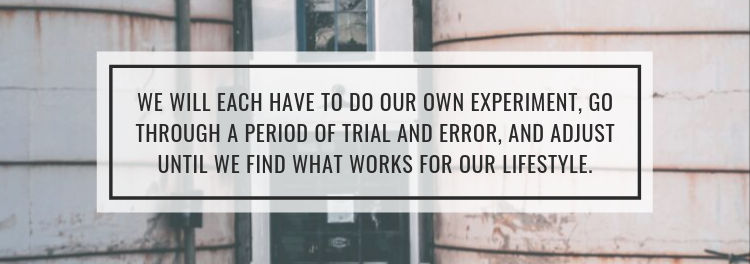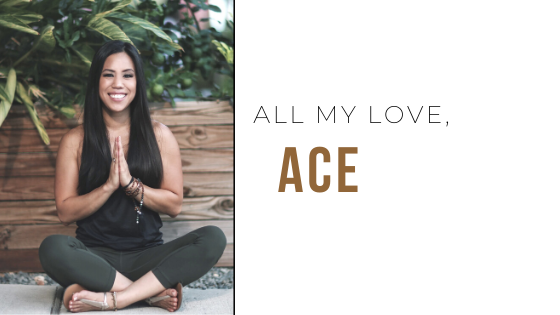
5 Steps to Define Your Core and Personal Values [Worksheet]
If we had to choose between living in heaven or hell, which one would it be? The most obvious answer would be in heaven. Ironically enough, most of us unconsciously choose hell. I say unconsciously because so many of us have cluttered our lives with an overabundance of choices, activities, experiences, people, food, things, etc. Many of which do not bring us any happiness. This happens when we do not define our core and personal values.
We have gotten lost in the fog and have a hard time finding our way out. Our valuable time and energy are being spent on things that do not add much value to our lives. We become a slave to our emotional choices that often choose our wants before our needs. Life seems to be a constant struggle just to get by. We let things control us instead of taking control of our own lives. This is why we unconsciously choose hell.
At this point, you may be asking, “what does this have anything to do with values?” Well, when we have defined our core and personal values, we start to live more intentional lives. They help us to guide our decision-making skills so that our emotions do not take over. We take control of our decisions and make more logical choices for ourselves. Each choice becomes an opportunity to lift the fog and uncover our path. It becomes so clear where we need to spend our precious time and energy. This is where I consider when we consciously choose to live out our definition of heaven and build a life that we love.

When we define our core and personal values they become powerful drivers that help to guide us in living happier lives. They give us a reason to say “Heck No!” to any decision that does not align with our values. When we say no to something, it creates space and provides an opportunity to say “Heck Yes!” to something great. Once we acknowledge the importance of values, the next step is to define your core and personal values.
So if you have not read the first part of this series on values, I suggest you take a few minutes to read it: Acknowledge the Importance of Core and Personal Values. When we understand and realize the value of a task and how it pertains to our lives, we are more inclined to take action.

Define your Core and Personal Values
In the following paragraphs, I’ve laid out the steps I took to uncover my core and personal values. This is just a combination of all the research I did and what made sense to me. I organized it in hopes to help be a guide as you uncover and define your own values. I know that there are always multiple solutions to a problem and several different angles to approach things. So, I encourage you to take what you need and leave the rest!
Ultimately, my goal is to get us to start thinking about these things and start moving forward in that direction. We will each have to do our own experiment, go through a period of trial and error, and adjust until we find what works for our lifestyle. No two paths will be the same and there is no right or wrong answer. I truly hope that you find what works best for you or start by taking the steps to get you there. If you find a way that works for you and it is not covered below, I hope you leave a comment or shoot me an email to share it with the community. That way, we can all continue to grow together!
I’ve created a worksheet so that you can print off and use to organize your thoughts! Subscribe below to grab a copy!
How to Define Core and Personal Values
Step 1: Start with a Beginners Mind
Do you remember when you wanted to learn something new for the very first time? Like children learning to walk, they are fearless in their attempts and their enthusiasm propels them forward. They never let fear get in the way of their progress or give up easily. With each fall, they get right back up. They master the art of walking and quickly learn how to run so fast that we regret teaching them how to walk in the first place… just kidding!
We were all children at one point. We were like a sponge that absorbed every bit of information we came across. I adopted this step from Scott Jeffrey’s approach to personal core values. He mentions that with no preconceived notions holding us back, we can access “inner truths to which your conscious mind is yet unaware.” When we begin with a beginner’s mind, our minds are a clean slate and the world becomes a wealth of knowledge. We are so open to all the many possibilities.

Step 2: Three Different Approaches to Define your Core and Personal Values**
**I suggest reading through all three of them and picking one or mix and match some of the points to your liking.
Carefully Determine Criteria
It is important to think about how we frame the criteria we use in determining our values. If we have horrible standards we cannot realistically expect to have quality values. You cannot make sense out of nonsense. I loved the approach from an article from Decision Innovation. They suggest using the criteria below to help hone in on our values:
- Consistent with your personal vision, mission, and core belief – eliminate personal values that are inconsistent or hinder your other decisions.
- Inspirational – great values should uplift and motivate you to keep moving forward even through the tough times.
- Unique – Everyone is different. What makes one person happy may leave another person feeling anxious or disengaged. Values should reflect our priorities in life and tend to emphasize our strengths while compensating for your weaknesses.
- Provides Guidance – Values should make it easier for us to establish boundaries and clearly identify if a decision falls in line with our life or not.
- Long-lasting – Personal values will evolve as we grow, mature, and gain life experience. They should not be quick to change.
- Meaningful and rewarding – Our values should help us to live our lives so that we can fulfill our given purpose.
After reviewing their criteria, I suggest reading the next two approaches below. Then, if you choose to do this method or a mix of the three, write down a list of any values that come to mind. All the values should satisfy the criteria above. During this time you may find similar or alternative words, write those down too. Multiple values make up our lives and they are usually connected in some way. This is essentially a brain dump to get whatever pops up in your head out and to put it down on paper.
For example, if wisdom a value that comes to mind, it should be consistent with your personal vision, mission, and core belief, inspirational, unique to you, provide guidance, long-lasting, and meaningful/rewarding. Other words that may also come to mind and fit the criteria are intelligence, understanding, knowledge, good judgment, insight, etc.

Defining Good vs. Bad Values:
I began to re-evaluate my values once I read The Subtle Art of Not Giving a F*ck by Mark Manson, a popular blogger, thinker, and life enthusiast. Mark has a very different way of putting things into perspective but his points resonated with me. In his intriguing article on personal values, Mark explains the qualities of good vs. bad values below:
Good Values:
+ EVIDENCE-BASED
+ CONSTRUCTIVE
+ CONTROLLABLE
Bad Values:
+ EMOTION-BASED
+ DESTRUCTIVE
+ UNCONTROLLABLE
He goes on to compare the two in more detail with examples. I quoted the ones from his article that stood out the most below. I do suggest reading Mark’s book if you are interested in the details.

Evidence-based vs. Emotion-based:
+ “Overly relying on your emotions is unreliable at best and damaging at worst.”
+ “Most of us, most of the time, make decisions inspired by our feeling, rather than based on knowledge or information.”
+ “Our feelings are generally self-centered, willing to give up long-term benefits for short-term gains, and are often warped and/or delusional.”
+ “Decide that something matters more than your own feelings-that some cause, some goal, some person, is worth occasionally getting hurt for.”
+ “Our purpose should be sought not merely through what feels good. It must be considered and reasoned. We must accumulate evidence supporting it.”
Constructive vs. Destructive Values:
+ “We don’t want to value things that harm ourselves or others. We do want to value things that enhance ourselves and others”
+ “What you value is often not as important as why you value it.”
+ “If you value martial arts because you enjoy hurting people, then that’s a bad value. But if you value it because you are in the military and want to learn to protect yourself and others- that’s a good value.”
+ “Ultimately, it’s the intention that matters most.”
Controllable vs. Uncontrollable Values
+ “When you value things that are outside your control, you essentially give up your life to that thing.”+ “We need values we can control, otherwise, our values control us.”
+ “Money is a bad value because you can’t always control it. Yes, you have some control over how much money you make, but not total control. Economies collapse, companies go under, entire profession get automated away by technology.”
+ “If everything you do is for the sake of money, and then tragedy strikes and all of the money is eaten up by hospital bills, you will lose much more than a loved one-you will lose your perceived purpose for living as well.”

This process is a little bit less structured than the first set of criteria. It is a simple foundation that gives us the freedom to really think outside the box. My suggestion is to read the last approach and then decide if this is the one you want to go with or use part of. Again, here you will brainstorm what your values are and see if they pass all three checkboxes for good values. If it has one bad value, take it off of your list or see how you can alter the value to make it evidence-based, constructive, and controllable.
For example, if you value personal freedom, you could make decisions in your careers to align accordingly. Let’s say that you decide to start your own business instead of climbing the corporate ladder. As Mark states in his article, “you will need more money for a while, but there might be some situations where you need less money. Or, where money is completely irrelevant… These higher-level, abstract values are better because they produce better problems.“
We will always run into problems, but quality values weed out many of the insignificant problems that we suffer from. Personal freedom is a good value because you can find evidence that supports it which is constructive and controllable. For instance, as we work and begin to achieve more personal freedom, it provides us the flexibility to choose when we want to take a vacation, spend more time with our loved ones, or use our time to invest in other skills.

Questions of Self-Reflection:
Michelle Fyfe’s posted an article on the Medium, with her steps on determining your core values. In my opinion, it makes more sense to start with step two, the self-reflection questions, and simply reference step one, looking over a list of values, if you need assistance. That way we are not being biased and choosing values that look good or that we would want to have. I have listed Michelle’s questions below.
- What is most important to you in your work?
- What is most important to you in your relationships?
- What is most important to you in your social life?
- What do you look for in a new friendship?
- What do you look for in a new romantic relationship?
- What do you look for in social activities/events to attend?
- What do you want for your future long-term relationships?
- What do you want from your life as a whole?
- What are some of your favorite activities and why?
- Describe a perfect day.
- List 10 things that make you angry/drive you nuts. Then look at what is missing or being violated in that situation.
- Write down some personal fantastic experiences in your life: What were some moments where you felt connected and joyful or full of meaning and significance. Consider these meaningful moments — peak experiences that stand out in your memories. What was happening to you? What was going on? What was being honored in your life?
- Look at the way you live — your code of conduct. What unspoken rules do you follow?
- What’s most important in your life? What must you have in your life to experience fulfillment? What are the personal values you must honor or a part of you shrivels up? Look at the list of possible values and see if any make you feel alive.
- Look at the people you admire and see what common values keep popping up. These are values that are striking a chord within you. Write down the qualities of the people you admire.
- Looking back at your life, what are things that you would take a stand for — even if it meant losing something or someone in the process. Write these things down in your journal.
- Look at your greatest failures, disappointments and moments of depression and sadness. What happened? Was there some violation of something you believe important? What was violated?
Once you have read all three approaches and you decide to go with this approach, I suggest picking at least 5 questions and elaborating on them to the best of your abilities. Pick the questions that resonate with you the most. Keep the criteria and/or good vs. bad values standards also in mind. Re-read your answers and then brainstorm any values that come to mind. Again, you may find similarities and alternative values here. Go ahead and jot them down.
If you need some help, you can look at Scott Jeffrey’s organized list of values as a reference. This was also downloadable from my first article.

Step 3: Group Similar Values Together
Once you have come up with a list of values, this is where you start to group similar and alternative values together. Organize them in a way that makes sense to you. There is no right or wrong answer here. They should be personal and pertain to you. Most people will have anywhere from five to ten groups. If there is a single group or if a group is not as large as the others, go ahead drop that group.
EXAMPLE:
- Generosity, communication, sharing, service, loyalty, family, support
- Creativity, talent, determination, challenge, skillfulness
- Openness, expressive, authenticity, wonder, uniqueness, originality
- Happiness, gratitude, thankful, welcoming, love, empathy
- Wisdom, knowledge *Drop this group
Step 4: Find a Central Theme
Look at the groups that you can have created. Is there one word that sticks out to you the most? Which word encompasses all the others? Find one word that can represent the group of words and continue to go through that process for every group. Once you are finished, create a new list out of the representative words.
EXAMPLE:
- Generosity, communication, sharing, service, loyalty, family, support
- Creativity, talent, determination, challenge, skillfulness
- Openness, expressive, authenticity, wonder, uniqueness, originality
- Happiness, gratitude, thankful, welcoming, love, empathy
- Support
- Creativity
- Authenticity
- Gratitude

Step 5: Prioritize Your Core and Personal Values
This is another important step that will help us to hone in on core and personal values. Knowing what values are more important than other values gives us more clarity. When faced with any choices, it empowers us to see the clear decision that will align with our lives. Especially when two values are on the line or competing for our attention, this helps us to see the decision as crystal clear.
Michelle Fyfe article uses a great example, “say creativity and authenticity are two of your top core values. To determine a ranking ask yourself: ‘Would I rather be creative or be authentic?’ And choose… You could be offered a very creative role in a company, yet have to dress an act in a manner that is very inauthentic. Knowing that authenticity ranks higher for you than creativity can help you realize that even though the job offers you the creative position you want, you would have to give up too much.” If you need some help, here are some questions from Scott Jeffrey’s post to get you thinking:
- What values are essential to your life?
- What values represent your primary way of being?
- What values are essential to support your inner self?
Compare each value against each other and rank them. Keep going through the process until you have them all ranked in order of importance. This is usually the most difficult part. It’s okay to take a breather, sleep on it, and then tweak it around. Nothing is ever set in stone.
EXAMPLE:
- Authenticity
- Creativity
- Support
- Gratitude

Conclusion:
Now, go ahead and pat yourself on the back because we have covered a lot of ground. I know it was not easy but it will all be worth it. People who are the happiest and the most productive have taken the time to do figure out the way they work. It allows them to take daily actions and make decisions that align with their core and personal values, which will soon be us too!
In the next article, 5 Steps to Direct Your Life According to Your Values, we will build a game plan. This is where we take our prioritized list, create some action steps, and start taking steps towards living our values. We will begin to bring our intentions to life and in true alignment with who we are.
Let’s Talk About It:
How did you define your core and personal values and how have you prioritized them?
I’d love to hear what your values are. Let me know by leaving a comment below!
If you found this information helpful and know someone who could benefit, don’t hesitate to let them know. Show them how much you care and share this post with them!
Don’t forget to subscribe below:
[convertkit form=1205273]
THANK YOU so much for your precious time!


Excellent
Free worksheet please
I would love your worksheets on personal core values for family
I am doing research on Core Values, Purpose, Mission and Vision.
Very Insightful
Thank you